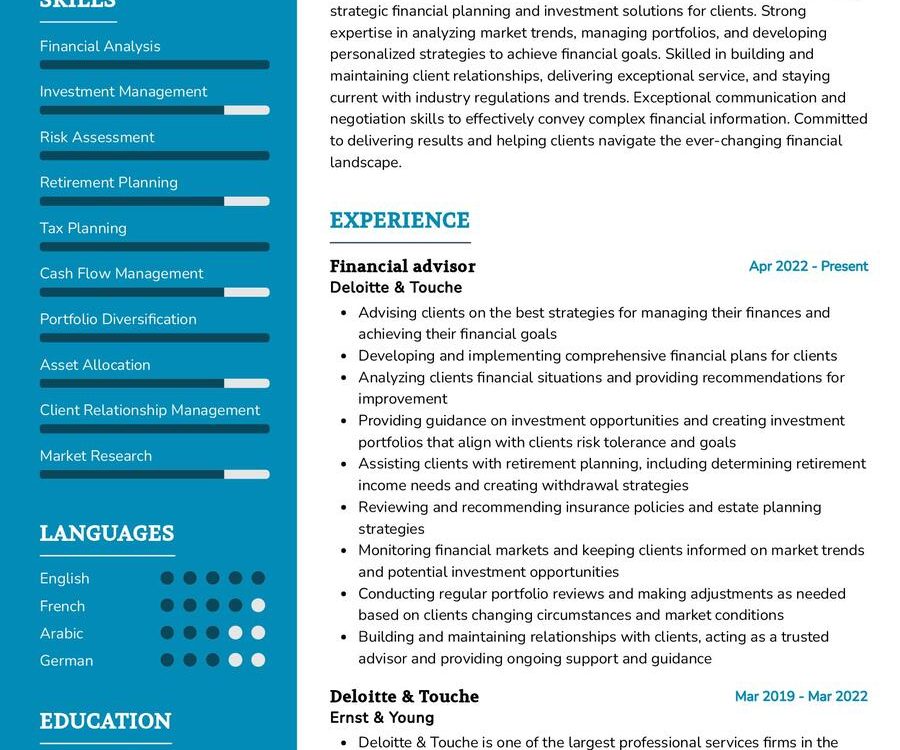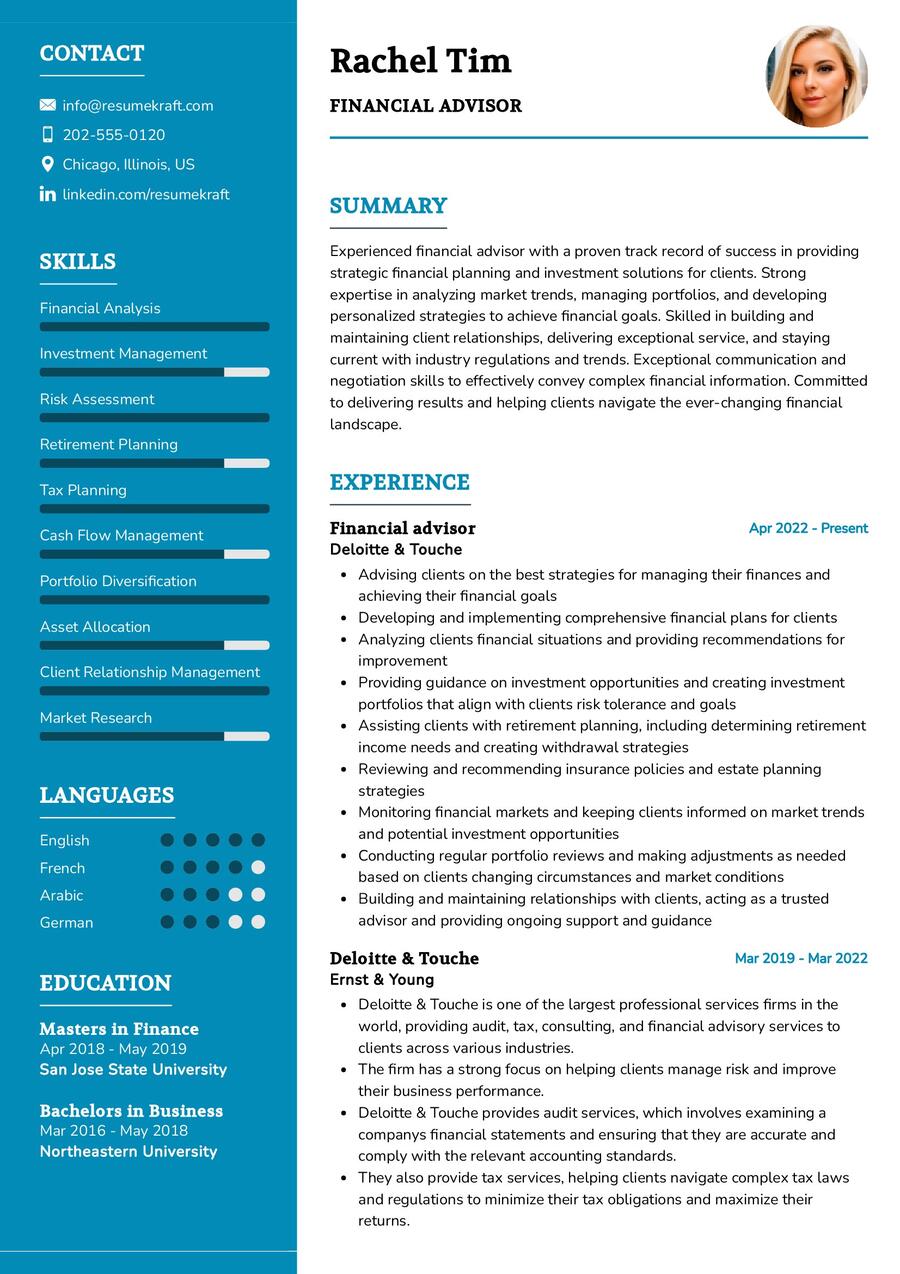Exploring the Role of a Financial Advisor
As the financial landscape continues to evolve, the role of a Financial Advisor has become indispensable for individuals and businesses alike. This article delves into the multifaceted responsibilities and requirements that define the role of a Financial Advisor, a position that demands a unique blend of financial acumen, interpersonal skills, and strategic vision.
What are the Financial Advisor Job Requirements?
Embarking on the path to become a Financial Advisor requires meeting specific prerequisites. Let’s explore the key requirements to embrace this role:
- A Bachelor’s or Master’s degree in Finance, Business Administration, or a related field, showcasing a solid foundation in financial principles.
- Profound knowledge of investment strategies, financial planning, and risk management.
- Experience in financial analysis, demonstrating a track record of making sound financial recommendations.
- Excellent communication and interpersonal skills, crucial for building trust and understanding clients’ financial goals.
- Certifications such as Certified Financial Planner (CFP) or Chartered Financial Analyst (CFA) can enhance your profile in the competitive financial advisory market.
- Adaptability to market changes and a keen understanding of economic trends.
Continuously expanding your knowledge and staying informed about market trends is vital in this dynamic field.
Responsibilities of a Financial Advisor
The role of a Financial Advisor is dynamic, involving various responsibilities that contribute to clients’ financial success. Let’s unravel the core duties that define this role:
- Conducting comprehensive financial assessments for clients, considering their income, expenses, and future goals.
- Developing personalized financial plans and investment strategies tailored to meet clients’ specific needs and risk tolerance.
- Providing ongoing financial guidance and adjusting strategies based on changes in clients’ circumstances or market conditions.
- Monitoring investment portfolios, ensuring alignment with clients’ objectives and market trends.
- Educating clients on financial matters and empowering them to make informed decisions about their financial future.
- Staying abreast of changes in financial regulations and industry trends to ensure compliance and best practices.
- Building and maintaining strong client relationships through effective communication and trust-building.
Each responsibility plays a crucial role in helping clients navigate the complexities of their financial journey.
Financial Advisor Resume Writing Tips
Crafting a compelling resume as a Financial Advisor is crucial for standing out in a competitive job market. Consider the following tips to showcase your skills effectively:
- Highlight your successful financial strategies, emphasizing positive outcomes for clients.
- Showcase instances where you provided sound financial advice that resulted in clients’ financial growth.
- Quantify your achievements by including metrics such as percentage growth in clients’ portfolios or successful investment returns.
- List relevant certifications and training programs, demonstrating your commitment to professional development.
- Customize your resume for each job application, aligning your skills with the specific requirements of the position.
Your resume is a reflection of your expertise and the value you bring to potential employers.
Financial Advisor Resume Summary Examples
Your resume summary sets the tone for your financial career story. Craft a powerful summary that encapsulates your experiences and strengths:
- “Results-oriented Financial Advisor with a proven track record of developing and implementing successful investment strategies, driving a 15% average annual return for clients.”
- “Experienced Financial Advisor specializing in comprehensive financial planning, dedicated to helping clients achieve their financial goals through strategic investment management.”
- “Dynamic Financial Advisor with expertise in risk management, delivering tailored financial solutions that align with clients’ long-term objectives.”
Your summary is the gateway to showcasing your financial prowess and attracting potential employers.
Create a Strong Experience Section for Your Financial Advisor Resume
The experience section of your resume is where you narrate your financial journey, emphasizing milestones and achievements:
- “Led a team of financial analysts, successfully managing client portfolios totaling $50 million in assets, resulting in a 20% increase in client wealth over two years.”
- “Implemented tax-efficient investment strategies for high-net-worth clients, optimizing their financial portfolios and minimizing tax liabilities.”
- “Conducted financial seminars for clients, increasing financial literacy and fostering stronger client-advisor relationships.”
Your experience section paints a vivid picture of your contributions and impact in the financial advisory realm.
Education Section for Your Financial Advisor Resume
Your educational background is the foundation of your financial expertise. Showcase your academic achievements in your resume:
- Master of Business Administration in Finance, XYZ University, 2017.
- Bachelor of Science in Financial Management, ABC University, 2015.
- Certified Financial Planner (CFP), demonstrating specialized knowledge in financial planning, 2018.
Each educational qualification is a testament to your commitment to excellence in the financial field.
Financial Advisor Skills for Your Resume
Your skill set is your toolkit, equipped with a range of abilities honed over the years. Showcase essential skills for a Financial Advisor:
Soft Skills:
- Effective communication and interpersonal skills for building strong client relationships.
- Analytical and problem-solving abilities to navigate complex financial scenarios.
- Attention to detail in financial analysis and planning.
- Adaptability to market changes and economic trends.
- Empathy and understanding in addressing clients’ financial concerns.
Hard Skills:
- Financial analysis and modeling for informed decision-making.
- Investment management and portfolio optimization for clients’ financial growth.
- Knowledge of financial regulations and compliance standards.
- Risk management strategies to safeguard clients’ investments.
- Technological proficiency in financial planning software and tools.
Each skill is a tool empowering you to guide clients towards financial success.
Common Mistakes to Avoid When Writing a Financial Advisor Resume
Ensure your resume avoids common pitfalls that can hinder your job application:
- Avoid generic resumes; tailor each application to the specific job requirements.
- Highlight achievements, not just job duties, to demonstrate your impact.
- Include a well-crafted cover letter to provide a more personalized introduction to potential employers.
- Balance technical language; ensure your resume is accessible to a diverse audience.
- Thoroughly proofread your resume to maintain a professional image.
Avoiding these mistakes ensures your resume effectively communicates your value as a Financial Advisor.
Key Takeaways for Your Financial Advisor Resume
As you craft your Financial Advisor resume, keep these key points in mind:
- Showcase your successful financial strategies and their impact on clients.
- Quantify your achievements to provide a tangible demonstration of your contributions.
- Highlight your ongoing commitment to professional development through certifications and training.
- Customize your resume for each application to align with specific job requirements.
Remember, your resume is your professional canvas, illustrating your journey, skills, and commitment to financial excellence. Best of luck!
Finally, feel free to utilize resources like AI Resume Builder, Resume Design, Resume Samples, Resume Examples, Resume Skills, Resume Help, Resume Synonyms, and Job Responsibilities to create a standout application and prepare for the Financial Advisor job interview.


